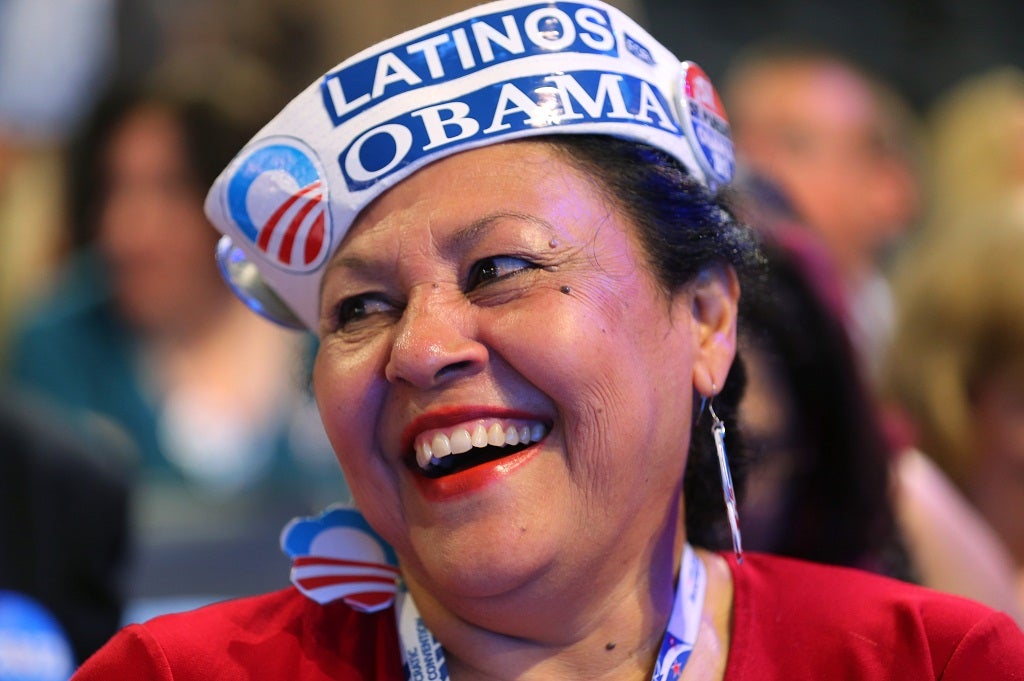The last English-American election: why Obama's victory over Romney increases Hispanic influence
In Texas and California, Hispanics account for a majority of schoolchildren. By 2016, demographic pressures will force Republicans in particular to amend their approach

Your support helps us to tell the story
From reproductive rights to climate change to Big Tech, The Independent is on the ground when the story is developing. Whether it's investigating the financials of Elon Musk's pro-Trump PAC or producing our latest documentary, 'The A Word', which shines a light on the American women fighting for reproductive rights, we know how important it is to parse out the facts from the messaging.
At such a critical moment in US history, we need reporters on the ground. Your donation allows us to keep sending journalists to speak to both sides of the story.
The Independent is trusted by Americans across the entire political spectrum. And unlike many other quality news outlets, we choose not to lock Americans out of our reporting and analysis with paywalls. We believe quality journalism should be available to everyone, paid for by those who can afford it.
Your support makes all the difference.Four years ago I stood in Chicago's Grant Park, scene of infamous rioting during the 1968 Democratic National Convention, to hear Barack Obama's victory speech. I had flown over on the promise of what would be one of the most historic election results during my lifetime and wasn't disappointed.
Implicitly recognising the scale of his achievement as the first African-American president, Obama spoke to those who would “put their hands to the arc of history and bend it once more”.
Tonight's election is an altogether more prosaic affair. The audacity of hope has given way to the audacity of hype. But all US elections are momentous and I believe historians will look back on tonight as hugely significant for another reason related to ethnicity. This is the last English-American election. Naturally future elections will be conducted in English; but from 2016, the advantage may fall to the party that recognises what few people outside America have fully grasped: the world's leading superpower is becoming Spanish.
The speed of demographic change is dizzying. Never mind Mexican-Americans being a third of the US population by 2050; in Texas and California, America's two most populous states (and therefore the most electorally valuable), a majority of schoolchildren are Hispanic. These pupils' votes are American, but their mother-tongue is Spanish. In New Mexico, eligible Latinos constitute 55.9 per cent of the electorate.
Hispanics lean towards the Democrats roughly three to one – that is, decisively in terms of the overall result. Their vote, the fastest growing part of the electorate, is therefore precious; and so desperate for it will each party be that, come 2016, their pursuit of Hispanics is certain to be much more blatant.
In policy, the immigration reform pioneered by Ronald Reagan – which Obama has failed to deliver – offers potential electoral gold. In presentation, expect many more Spanish language ads, and whole campaign rallies conducted in Spanish. In personnel, both Republicans and Democrats will be tempted to field Latinos: Marco Rubio for the Republicans, perhaps, and Julian Castro for the Democrats.
In other words, pursuit of the Hispanic vote will fundamentally and irreversibly change the tenor and tone of the election. It would be ironic indeed if the legacy of America's first black president were to bequeath a country who elections were truly bilingual. That is where America is heading.
Join our commenting forum
Join thought-provoking conversations, follow other Independent readers and see their replies
Comments